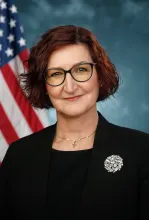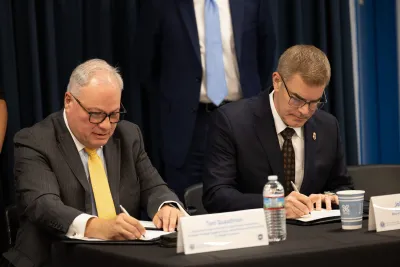-
Summer has just flown by, and we’re already in the midst of back-to-school season!
It's an exciting time for students and parents alike, but also a time that requires us to be especially vigilant. As we go about shopping for school supplies and new clothes, we need to be aware of the counterfeit goods that have flooded the market.
Such fakes are not only made of shoddy materials but can also pose serious health and safety risks. We’ve come across backpacks made with harmful chemicals or unsafe levels of lead, defective bicycle helmets, and faulty electronic devices that can cause fires, just to name a few.
CBP works diligently to protect American families from the dangers of these counterfeit goods. For more on the dangers of counterfeit goods and what you can do to avoid them, see my blog over at the U.S. Chamber of Commerce’s website.
~ Executive Assistant Commissioner AnnMarie R. Highsmith
Contents
- EAC's Message
- I. Office of Trade Activity
- II. News You Can Use
- Article 1: Deputy Executive Assistant Commissioner John Leonard Talks Customs Broker Training with Federal News Network
- Article 2: CBP Officers in Louisville Intercept 130 Designer Watches Worth $4.24 Million
- Article 3: Luxury Jewelry, Handbags, Watches & More Worth almost $800K Intercepted by CBP Officers at Chicago’s International Mail Facility
- Article 4: Memphis CBP, HSI Repatriates Precious Cultural Artifacts to Mexico
- Article 5: CBP agriculture specialists discover first-in-nation pest in San Diego
- Article 6: CBP officers stop spider monkey smuggling attempt at Calexico port of entry
- Article 7: CBP, FWS Seize Seahorses, Snakes, Snake Oil, and Prohibited Pork Products at Dulles Airport
- Trade Statistics
I. Office of Trade Activity
CBP renews anti-counterfeiting partnership with U.S. Chamber of Commerce
On August 10, Deputy Executive Assistant Commissioner (DEAC) John Leonard met with the U.S. Chamber of Commerce (Chamber) in New York to sign a renewal addendum extending a memorandum of understanding (MOU) between CBP and the Chamber for an additional five years.
The MOU, which was initially announced in May 2021, established efforts to share information and connect resources in efforts to combat the flow of counterfeit goods. In the two years since the MOU was enacted, CBP and the Chamber have worked together to host successful outreach engagements between government and private industry, share data on known or suspected intellectual property rights (IPR) violations, and conduct joint training sessions.
The initiative has also focused on public awareness, with multiple campaigns − such as the current Shop Smart back-to-school campaign − highlighting the dangers of counterfeit goods and providing tips to help consumers avoid them. Read more about the joint initiative as well as the MOU signing event on the Chamber's website and on Twitter @CBPTradeGov.
Following the signing, DEAC Leonard participated in a round table discussion in which leaders from CBP and the Chamber discussed ways that both entities are working to further the protection of IPR, such as providing training in the field, sharing information, and working with partner government agencies.
Tackling high-risk shipments with Global Business Identifier
On July 21, 2023, CBP extended the test period for the Global Business Identifier (GBI) initiative through February 14, 2024, to allow for increased participation. CBP is working with industry and 13 partner government agencies to pinpoint and stop high-risk shipments arriving at our borders with the Global Business Identifier (GBI) Evaluative Proof of Concept (EPoC). This collaborative effort seeks to enhance trade facilitation and trade security by testing and developing a unified business identifier solution to achieve better visibility into global supply chains.
Companies interested in participating in the GBI test can provide data for one or more entity identifiers through the Automated Commercial Environment. Participation in the test is voluntary, and a select number of trade user volunteers will be chosen to test the single identifier solution. By participating, members of the trade community will have the opportunity to evaluate and provide feedback on the GBI EPoC design and scope and test the optimal combination of entity identifiers. The transmission of GBI data only applies to current Automated Broker Interface participants.
For detailed information about the GBI EPoC, please review the updated Federal Register Notice and visit the GBI webpage. For any inquiries or questions, please contact GBI@cbp.dhs.gov.
CBP opens registration period for Customs Broker License Exam
On August 14, CBP opened registration for the next Customs Broker License Exam (CBLE), which will occur on October 25. The upcoming exam will have a new configuration, with 80 multiple-choice questions, each containing four possible answer choices, rather than the previous five. Registration will remain open until September 12, 2023. Customs broker candidates can view additional information and register for the CBLE on CBP’s website.
II. News You Can Use
-
CBP Officers in Louisville Intercept 130 Designer Watches Worth $4.24 Million
-
Memphis CBP, HSI Repatriates Precious Cultural Artifacts to Mexico
-
CBP agriculture specialists discover first-in-nation pest in San Diego
-
CBP officers stop spider monkey smuggling attempt at Calexico port of entry
-
CBP, FWS Seize Seahorses, Snakes, Snake Oil, and Prohibited Pork Products at Dulles Airport
Trade Statistics
Monthly Trade Statistics
In July, CBP processed more than 3 million entry summaries valued $262 billion, identifying estimated duties of nearly $7 billion to be collected by the U.S. government. Trade via the ocean environment accounted for more than 45 percent of the total import value, followed by air, truck, and rail. CBP identified 388 entries valued at more than $107 million for further examination based on the suspected use of forced labor, and which may be subject to a Withhold Release Order, Forced Labor Finding, or the Uyghur Forced Labor Prevention Act’s rebuttable presumption prohibiting importation into the United States. CBP seized nearly 1,698 shipments that contained counterfeit goods valued at more than $165 million.



